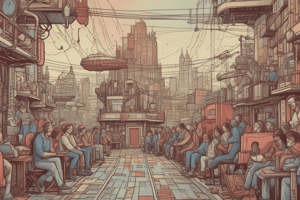Podcast
Questions and Answers
Skilled labor requires more investment in human capital but may create less value compared to unskilled labor.
Skilled labor requires more investment in human capital but may create less value compared to unskilled labor.
False (B)
James Devine argues that all labor should be considered equal in its ability to create value.
James Devine argues that all labor should be considered equal in its ability to create value.
False (B)
Adam Smith believed that labor alone determined the value of goods.
Adam Smith believed that labor alone determined the value of goods.
False (B)
The text suggests that understanding different perspectives on labor's contribution to value creation is important for formulating effective economic policies.
The text suggests that understanding different perspectives on labor's contribution to value creation is important for formulating effective economic policies.
The perceived contribution of skilled labor and simple labor to overall value creation is the same.
The perceived contribution of skilled labor and simple labor to overall value creation is the same.
The text discusses the complex interplay between labor, value, and pricing dynamics in a market economy.
The text discusses the complex interplay between labor, value, and pricing dynamics in a market economy.
Marx's value theory suggests that the value of labor is determined solely by the wages paid to workers.
Marx's value theory suggests that the value of labor is determined solely by the wages paid to workers.
The concept of 'abstract labor' refers to the socially necessary time required to produce a particular good or service.
The concept of 'abstract labor' refers to the socially necessary time required to produce a particular good or service.
In Marxian value theory, labor is considered a fundamental element of production that creates value through the process of creating commodities.
In Marxian value theory, labor is considered a fundamental element of production that creates value through the process of creating commodities.
The value of labor is solely determined by the time spent transforming raw materials into finished products.
The value of labor is solely determined by the time spent transforming raw materials into finished products.
The distinction between the price of labor and its value is crucial in understanding the relationship between labor and value, according to Marxian value theory.
The distinction between the price of labor and its value is crucial in understanding the relationship between labor and value, according to Marxian value theory.
The value of labor is always equal to the price paid for labor services (wages).
The value of labor is always equal to the price paid for labor services (wages).
Flashcards are hidden until you start studying
Study Notes
Labor and Its Value
The concept of labor and its value has been a subject of interest among economists since the early days of economic thought. This discussion revolves around understanding how labor contributes to the creation of value and how this value is measured and expressed in economic terms. In this article, we will explore various perspectives on this topic and delve deeper into the theoretical frameworks that underpin these concepts.
Abstract Labor and Its Value-Form
Marxian value theory, as proposed by Karl Marx, provides one of the most influential interpretations of labor and its value. According to Marx, labor is a fundamental element of production, and it creates value through the process of creating commodities. The value of labor lies in the time spent transforming raw materials into finished products. This transformation, known as "abstract labor," refers to the socially necessary time required to produce a particular good or service.
The value of labor is often compared to the price paid for labor services, also known as wages. However, there is a key difference between them. While wages represent the market price of labor power, they do not necessarily reflect the true value of labor. Instead, the real value of labor is determined by the amount of abstract labor embodied in the product being produced. Therefore, the distinction between the price of labor and its value is crucial in understanding the relationship between labor and value.
Simple Labor vs. Skilled Labor
Another aspect of labor and its value pertains to the debate over simple labor versus skilled labor. While both forms contribute to the overall value created within society, their perceived contribution may differ based on various factors. For instance, skilled labor may require more investment in human capital, but it can potentially create more value due to higher productivity levels. James Devine argues that we should reconsider the value-creating capacity of skilled labor, rather than assuming that all labor is equal in its ability to create value.
Challenging Standard Interpretations
Adam Smith's work on labor and value challenges conventional interpretations. Contrary to popular belief, Smith did not believe that labor alone was responsible for determining the value of goods. He argued that other factors, such as rents and profits, also play a role in shaping the prices of goods. Smith's perspective offers a nuanced view of the complex interplay between labor, value, and pricing dynamics in a market economy.
In conclusion, the topic of labor and its value encompasses a wide range of ideas and theories within economics. Understanding the various perspectives on labor's contribution to the creation of value is essential for formulating effective economic policies and maintaining a balanced economic system. As these debates continue to evolve, so too will our understanding of labor and its significance in the broader context of the economy.
Studying That Suits You
Use AI to generate personalized quizzes and flashcards to suit your learning preferences.



